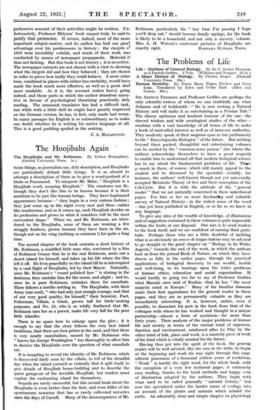The Hoojibahs Again
The Hoojibahs and Mr. Robinson. By Esther Boumphrey. (Oxford University Press. 5s.) SOME things, as journalists say, defy description, and Hoojibahs are particularly defiant little beings. It is as absurd to attempt a description of them as to give a word-portrait of a Dodo or Psammead. To misquote Mr. Milne, " Hoojibah is a Hoojibah word, meaning Hoojibah." The creatures can fly, though they don't like this to be known because it is their ambition to be just like human beings. They have haphazard appearances because—" they begin in a very curious fashion ; they just come up in the night every now and then—rather like mushrooms, and as it comes up, each Hoojibah decides on its profession and grows to what it considers will be the most convenient shape." When we, and Mr. Robinson, are intro- duced to the Hoojibahs, some of them are wearing a few straggly feathers, grown because they have been in the air, though not on the wing (nothing so common !) for quite a long time.
The second chapter of the book contains a short history of Mr. Robinson, a muddled little man who, convinced by a film of Robinson Crusoe that he is the real Robinson, seeks out a desert island for himself, and takes up his life where the film left it off. He lives peacefully on the island till he is interrupted by a vast flight of Hoojibahs, led by their Mayor. Naturally, since Mr. Robinson's " round polished face " is shining in the darkness, they mistake him for the moon, and alight ; and he, since he is pure Robinson, mistakes them for cannibals. There follows a terrific settling in. The Hoojibahs, with their Army (one soul), " who had only just enough courage, and that of not very good quality, for himself," their Scientist, Poet, Policeman, Villain, a Giant, grown tall for birds'-nesting purposes, and No. 55, who is so wildly feathered that Mr. Robinson uses her as a parrot, make life very full for the poor little islander.
There is no space here to enlarge upon the plot ; it is enough to say that the story follows the very best island traditions, that there are foot-prints in the sand, and that there is very nearly cannibalism, caused by Mr. Robinson who " knows his George Washington " too thoroughly to allow him to deceive the Hoojibahs over the question of what cannibals eat.
It is tempting to reveal the identity of Mr. Robinson, which is discovered fairly soon by the villain, to tell of the dreadful day when the island yawned so violently that it split itself, to give details of Hoojibah house-building and to describe the queer goings-on of the invisible Hoojibah, but readers must explore the enchanting island for themselves.
Sequels are rarely successful, but this second book about the Hoojibahs is even better than the first, and even fuller of the spontaneous nonsense that has so rarely enlivened nurseries since the days of Carroll. Many of the ineonsequences of Mr.
Robinson, particularly his " Any time I'm passing I hope you'll drop out," should become family sayings, for the book is likely to be a household, and not only a nursery, volume. Miss A. H. Watson's exuberant pictures of Hoojibahs are






























 Previous page
Previous page